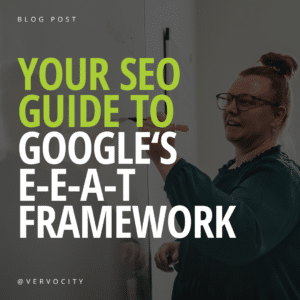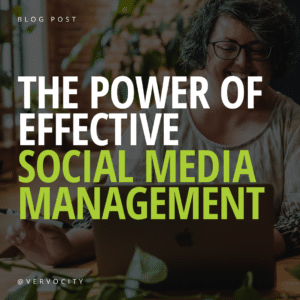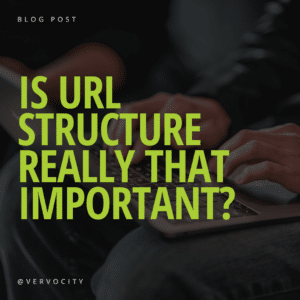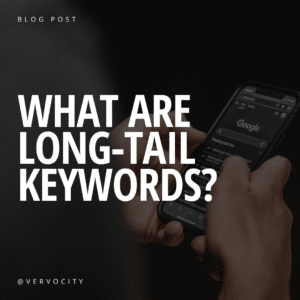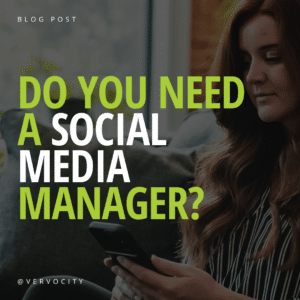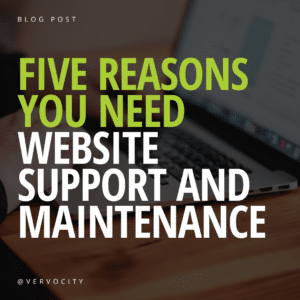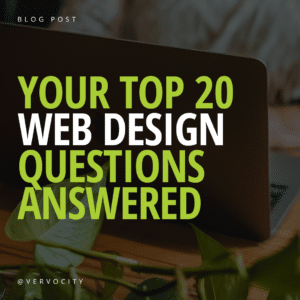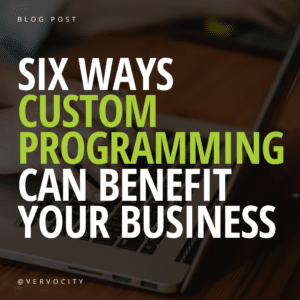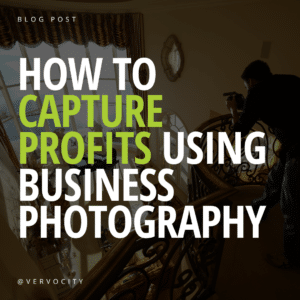“Drive more traffic to your site.”
“Double your leads overnight.”
“Maximize your ROI.”
We could go on and on with one-liners about the benefits of pay-per-click (PPC) advertising. However, we know that as a business owner or marketing specialist, you’ve likely already been bombarded with vague promises of digital success.
So what can you actually expect from pay-per-click advertising?
As the name suggests, advertisers only pay when someone clicks on their ad. It’s basically a way to buy visits to a landing page or website rather than obtaining them organically. Google Ads (formerly known as Google AdWords) is the most popular platform for PPC advertising, so you’ve likely seen links with the words “Sponsored” above them at the top of your search results. Advertisers pay to have these sponsored links appear when someone searches a keyword or phrase related to their business offerings, products, or services. See the sample below for a sponsored ad for Google Ads.

In this blog, we’ll discuss truths about PPC advertising so you can make an informed decision about whether or not it’s the right move for your brand.
You don’t have to spend a fortune
Many businesses believe that PPC advertising requires a significant financial investment. While it’s true that PPC can be a more expensive marketing option than social media or email marketing, it can also be incredibly effective. Plus, you have complete control over your budget and can set daily limits to ensure you don’t overspend.
You can create a successful pay-per-click campaign on a smaller budget if you know how to optimize your ads. Targeting the right audience, keywords, and ad placements can help you get the most bang for your buck. Create ad groups with specific keywords that are relevant to your brand and audience searches. Craft compelling ads with clear call-to-actions, and use dynamic ads for your retargeting efforts. Set a reasonable budget, bid strategically, and monitor your ad performance to optimize your ad spends.
You don’t have to break the bank to get impressive results.
It’s not just about the clicks
Pay-per-click advertising might sound like it’s all about the clicks, but it’s actually about the conversions. Conversions are the actions that you want people to take after clicking on your ad, such as filling out a form, purchasing a product, or subscribing to a newsletter.
The quality of your ads can impact how many clicks you receive, as well as the overall success of your campaign. Your ad copy is the main way you’ll entice people to click on your ad, so make sure it’s well-written and eye-catching. Your ad should have a clear call-to-action, be relevant to your landing page, and highlight your USP (unique selling point).
Conversions show that people are interested in your offer and that your ad is delivering the results you’re looking for. Clicks can be great, but if they don’t lead to a sale or a conversation, then they are pretty much useless.
Your landing page matters
Landing pages play a huge part in turning clicks to conversions. Google’s algorithm not only looks at how much you’re willing to pay for each click but also at the quality of your ads and landing pages. The landing page that people are taken to after clicking on your ad needs to be relevant and engaging. It should have a clear message that matches your ad, with a clear call-to-action and easy-to-navigate layout. You want to give people a reason to stay on your site and potentially convert into a customer.
It’s all about targeting
Businesses of all sizes can benefit from PPC by targeting the right audience and keywords. Google Ads allow you to target your ads based on a variety of factors, such as location, demographics, and interests. Use location targeting, ad scheduling, and audience segmentation to narrow your audience and reach potential customers in your locality. By targeting the right audience, you can ensure that your ads are being seen by the people who are most likely to be interested in your products or services.
It’s important to do thorough keyword research before setting up your campaigns. Keyword targeting helps to level the playing field for smaller businesses against established brands. Avoid competing with the industry giants for generic keywords with high costs per click. Instead, focus on niche and long-tail keywords that reflect your brand, value, and customer needs.
It’s Not a “Set It and Forget It” Strategy
Contrary to what some may believe, PPC advertising isn’t something you can just set up and forget about. It requires constant monitoring, analysis, and optimization to increase your return on investment (ROI). Analyze your ad performance regularly, adjust your bids and keywords according to changing market trends, and test your ad creatives.
Don’t hesitate to try new ad campaigns and ad formats. What works for one business might not work for another.
You can test, optimize, and track results
The beauty of PPC advertising is that you can track and measure your results, so make use of this data to continually improve your campaign. Test different ad copy, landing pages, and bidding strategies to see what works best, and optimize accordingly.
You can also see exactly how many clicks your ads are getting, measure how much you’re spending, and calculate your ROI. Use this information to adjust your campaign as needed and get the most out of your budget.
Results aren’t an Instant Fix-all
PPC advertising can be a powerful tool for businesses who want to increase their online presence and drive more traffic to their website. However, some people are under the impression that PPC provides instant, amazing results. While it’s true that you can start seeing results from campaigns relatively quickly, it’s important to keep in mind that success takes time. You still need to build up your campaigns, research your keywords, and test out different ad copy to optimize your results.
PPC Isn’t Right for Every Business
Don’t worry, we’re not trying to discourage you from trying a new marketing tactic. We just want to keep you informed. Not every business is a good candidate for PPC advertising. Some may not have the audience for it, while others may need a little bit more time to get there.
Here are some reasons why PPC may not be the best option:
1. Your industry is too niche
Businesses that operate in a very niche industry may find it challenging to see a positive ROI from PPC advertising. There simply may not be enough search volume to justify the costs. Instead, try to find other marketing channels that cater to your specific audience. For example, if you’re in the B2B software business, LinkedIn advertising might be a better option than PPC.
2. You don’t have a clear business or conversion goal
PPC advertising is all about driving conversions and achieving specific business goals. If a business doesn’t have a clear idea of what it wants to achieve with its PPC campaigns, it could end up wasting a lot of money. Campaigns will fall flat without a clear conversion goal or a targeted landing page to drive that conversion. PPC might not be the best choice for businesses without marketing goals or a clear strategy in place.
3. Your target audience isn’t searching on Google
Not everyone uses Google to find what they’re looking for. If the majority of a business’s target audience is not internet-savvy or doesn’t use search engines to find products or services, then PPC would not be an effective marketing strategy.
4. Your website isn’t optimized for conversions
If your website design isn’t optimized for the user experience in mind, you can spend a fortune on PPC advertising and still see little to no conversions. Before investing in PPC, take a step back and assess your website. Is it easy to navigate? Does it load quickly? Is the checkout process seamless? These are all factors that can influence your conversion rates. Make sure your website is optimized for conversions before diving into PPC.
5. You don’t have the budget right now
Highly competitive industries often require a higher cost-per-click to rank well in search engine results. Businesses just starting out may not have the extra funds to spare. That being said, there are other ways to get your brand out there, such as social media management, content marketing, and search engine optimization (SEO). These methods can be just as effective in driving traffic to your website without stretching your budget too thin.
Conclusion
PPC advertising can be a powerful and versatile way for businesses of any size to drive targeted traffic to their website and generate high-quality leads. However, knowing what to expect and how to go about it is key for optimized performance and success. Start with a plan, make data-driven decisions, and keep testing and adjusting to ensure that your PPC campaigns continue to deliver results and grow your business.
Setting up and managing your own PPC campaigns can be a lot to handle, especially if you’re running a busy business. Vervocity can ensure that your campaigns are properly set up and monitored, and that you’re getting the most out of your advertising budget. Plus, our advertising specialist will provide expert insights and make adjustments to improve performance. We offer monthly transparent reporting so you know exactly how your ads are performing.
Interested in learning more about pay-per-click advertising? Reach out to us or give us a call at (217) 222-1451 to get started!

